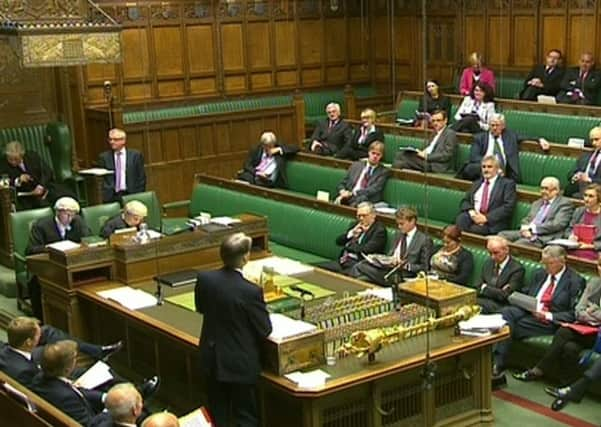EU’s legitimacy ‘wafer thin’ in UK, says Hammond


MPs are expected to pass the second reading of the Bill but the government is under pressure from eurosceptic Tory backbenchers to ensure that the government will not play a role in the referendum campaign and both sides will be equally funded.
In Foreign Office questions before the debate Mr Hammond came under pressure from former First Minister Alex Salmond over the position of ministers in the campaign, but refused to say whether they will be given a free hand to join either side of the debate.
Advertisement
Hide AdAdvertisement
Hide AdMr Hammond also used his opening speech to reject calls for EU citizens and 16- and 17-year-olds to be allowed to vote despite calls for inclusion by both the SNP and Labour.
Mr Salmond was also due to push the only amendment to the Bill to create a double lock which means the UK could only exit the EU if there was a majority in each of the four nations rather than an overall majority.
Speaking during the second reading debate on the European Union Referendum Bill, Mr Hammond said the legislation would fulfil the simple task of renewing the “wafer-thin” democratic legitimacy of the EU.
Mr Hammond said: “It sets in stone our commitment to hold the referendum before the end of 2017. Of course, if the process is completed sooner, the referendum could be held sooner.”
The Foreign Secretary resisted calls from MPs to specify what the Prime Minister would demand in his negotiations with European leaders but pointed to the EU Council on June 26 as a key date.
Mr Hammond said: “Underpinning this whole process is an absolute commitment to allow the British people in an in/out referendum to have the final say on this issue.
“We need a fundamental change in the way the European Union operates. It is now a union which has at its core a eurozone of 19 members which will integrate more closely together.
“There needs to be an explicit recognition those who are not part of that core do not need to pursue ever closer union. There needs to be an explicit protection of the interests of those non-eurozone members as the EU goes forward.
Advertisement
Hide AdAdvertisement
Hide Ad“That is an example of an area where we need specific structural change to the way the European Union operates. Of course, negotiating with 27 member states will not be easy and it will not happen overnight.
“But we expect to be able to negotiate a new deal which will address the concerns of the British people which we will then put to them in the promised referendum.”
The principle of a referendum is set to clear the first Commons hurdle for the third time at 7pm today, following two abortive attempts launched by Tory backbenchers in the last parliament.
In successive years, Stockton South MP James Wharton and Bromley and Chislehurst MP Bob Neill successfully got private member’s bills past second reading.
But on both occasions, the legislation faced deadlock before becoming law.
He was challenged by Western Isles SNP MP Angus MacNeil over the exclusion of one of his constituents, a German, from the vote.
But Mr Hammond later noted that all the referendums on the EU by other member states had not included EU citizens from other countries.
And he said : “My view is that this is an issue of national importance for British citizens so it is right that the Westminster franchise is used.
Advertisement
Hide AdAdvertisement
Hide Ad“It would be wrong for the franchise to be extended to European Union citizens who may have different priorities in this debate.”
In his speech Labour shadow foreign secretary Hilary Benn called for 16- and 17-year-olds to be included in the vote.
He warned that the “forces of conservatism” would not be forgiven for excluding those who will “have to live with the consequences of the vote the longest.”
Mr Hammond said, on entitlement to vote in the referendum, that the parliamentary franchise “is the right starting point”.
The Bill, he said, extended the franchise in two very limited respects, to members of the House of Lords who “meet certain qualifications” and to Commonwealth citizens resident in Gibraltar.
He said: “Some will argue that we should extend the franchise further to 16- and 17-year-olds perhaps or even to citizens of other EU countries resident here. We do not agree. This is an issue of national importance about Britain’s relationship with the EU and is is right that the Westminster parliamentary franchise should be the basis for consulting the British people.”
It would be “wrong”, he said, to include 16 and 17-year-olds in the referendum as an addition to the Westminster franchise, and it would be a “travesty” to seek to include EU nationals “whose interests may be very different from those of British people”.
Introducing his amendment, Mr Salmond mocked the “Bavarian blunder” by the Prime Minister angering Tories by initially ruling out ministers voting against staying in the EU if he succeeds in his negotiations.
Advertisement
Hide AdAdvertisement
Hide AdHe said: “We have a right to know if collective responsibility will apply.”
And he added: “Nobody believes the Prime Minister will actually want to take us out of the referendum.”
Referring back to the previous Scottish independence referendum, he also warned the government against trying to win the referendum with “a last minute vow” or a “sudden appearance by [Treasury chief mandarin] Sir Nicholas MacPherson before a select committee.”
He added: “My advice would be to nail it down now.”